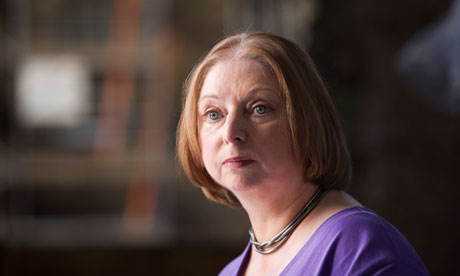The Wolf Hall author tells the Edinburgh book festival of her plans for the conclusion of her Tudor trilogy

Hilary Mantel is working on a new novel, The Mirror and the Light, the conclusion of her Cromwell trilogy. Photograph: Murdo Macleod
Hilary Mantel, winner of the 2009 Man Booker prize for her novel Wolf Hall, and last month longlisted again for its sequel, has fuelled the debate about the literary claims of historical fiction by arguing that characterisation in historical novels, "even very good historical novels", is "often two-dimensional".
She told the audience at the Edinburgh international book festival: "It's a big ask, to give the reader all the background information and all the foreground information and make the characters work as well." She said in her own books, "what I am trying to do is to write as I would in any other novel, so that it has a literary quality as well as, I hope, a historical quality".
She added: "I don't see why you should compromise. In writing a historical novel you use all the tricks you have learned on diverse subject matter and use all the techniques you bring to novels of contemporary life."
Mantel, making a rare public appearance in a year when fragile health has limited her engagements, was speaking about Bring Up the Bodies, the second book in her projected trilogy about the 16th-century politician Thomas Cromwell, who started as "a blacksmith's son, and rose to be Earl of Essex, Henry VIII's right-hand man, and minister of everything" – before ending up on the scaffold.
Over her career Mantel has executed numerous characters, including Marie-Antoinette and many other figures in her 1992 novel about the French revolution, A Place of Greater Safety; as well as Anne Boleyn and her supposed lovers in Bring Up the Bodies. "I've marched a lot of people to the scaffold, and beheading seems to be my favourite sport," she said.
Despite the inevitability of Cromwell's death, however, she said that "in every scene, even the quiet ones, I try to create turning points, multiple turning points. So the reader knows how it's going to turn out, but the reader's expectation of how and why is constantly challenged."
Full story at The Guardian
She told the audience at the Edinburgh international book festival: "It's a big ask, to give the reader all the background information and all the foreground information and make the characters work as well." She said in her own books, "what I am trying to do is to write as I would in any other novel, so that it has a literary quality as well as, I hope, a historical quality".
She added: "I don't see why you should compromise. In writing a historical novel you use all the tricks you have learned on diverse subject matter and use all the techniques you bring to novels of contemporary life."
Mantel, making a rare public appearance in a year when fragile health has limited her engagements, was speaking about Bring Up the Bodies, the second book in her projected trilogy about the 16th-century politician Thomas Cromwell, who started as "a blacksmith's son, and rose to be Earl of Essex, Henry VIII's right-hand man, and minister of everything" – before ending up on the scaffold.
Over her career Mantel has executed numerous characters, including Marie-Antoinette and many other figures in her 1992 novel about the French revolution, A Place of Greater Safety; as well as Anne Boleyn and her supposed lovers in Bring Up the Bodies. "I've marched a lot of people to the scaffold, and beheading seems to be my favourite sport," she said.
Despite the inevitability of Cromwell's death, however, she said that "in every scene, even the quiet ones, I try to create turning points, multiple turning points. So the reader knows how it's going to turn out, but the reader's expectation of how and why is constantly challenged."
Full story at The Guardian
No comments:
Post a Comment